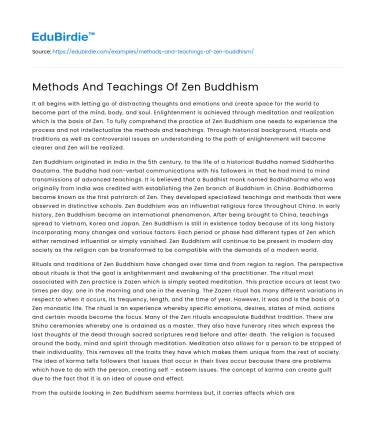It all begins with letting go of distracting thoughts and emotions and create space for the world to become part of the mind, body, and soul. Enlightenment is achieved through meditation and realization which is the basis of Zen. To fully comprehend the practice of Zen Buddhism one needs to experience the process and not intellectualize the methods and teachings. Through historical background, rituals and traditions as well as controversial issues an understanding to the path of enlightenment will become clearer and Zen will be realized.
Zen Buddhism originated in India in the 5th century, to the life of a historical Buddha named Siddhartha Gautama. The Buddha had non-verbal communications with his followers in that he had mind to mind transmissions of advanced teachings. It is believed that a Buddhist monk named Bodhidharma who was originally from India was credited with establishing the Zen branch of Buddhism in China. Bodhidharma became known as the first patriarch of Zen. They developed specialized teachings and methods that were observed in distinctive schools. Zen Buddhism was an influential religious force throughout China. In early history, Zen Buddhism became an international phenomenon. After being brought to China, teachings spread to Vietnam, Korea and Japan. Zen Buddhism is still in existence today because of its long history incorporating many changes and various factors. Each period or phase had different types of Zen which either remained influential or simply vanished. Zen Buddhism will continue to be present in modern day society as the religion can be transformed to be compatible with the demands of a modern world.
Save your time!
We can take care of your essay
- Proper editing and formatting
- Free revision, title page, and bibliography
- Flexible prices and money-back guarantee
Rituals and traditions of Zen Buddhism have changed over time and from region to region. The perspective about rituals is that the goal is enlightenment and awakening of the practitioner. The ritual most associated with Zen practice is Zazen which is simply seated meditation. This practice occurs at least two times per day; one in the morning and one in the evening. The Zazen ritual has many different variations in respect to when it occurs, its frequency, length, and the time of year. However, it was and is the basis of a Zen monastic life. The ritual is an experience whereby specific emotions, desires, states of mind, actions and certain moods become the focus. Many of the Zen rituals encapsulate Buddhist tradition. There are Shiho ceremonies whereby one is ordained as a master. They also have funerary rites which express the last thoughts of the dead through sacred scriptures read before and after death. The religion is focused around the body, mind and spirit through meditation. Meditation also allows for a person to be stripped of their individuality. This removes all the traits they have which makes them unique from the rest of society. The idea of karma tells followers that issues that occur in their lives occur because there are problems which have to do with the person, creating self – esteem issues. The concept of karma can create guilt due to the fact that it is an idea of cause and effect.
From the outside looking in Zen Buddhism seems harmless but, it carries affects which are not visible.
A path to enlightenment can be found through historical background, rituals and traditions and controversial issues of Zen Buddhism. To genuinely comprehend Zen Buddhism, one must go through the process and not rationalize the beliefs and teachings. Zen revolves around the enlightenment, which can be achieved through meditation and realization. The body, mind, and soul can become one with the world once emotions and distracting thoughts have been let go from the mind.
Did you like this example?
Make sure you submit a unique essay
Our writers will provide you with an essay sample written from scratch: any topic, any deadline, any instructions.
Cite this paper
-
APA
-
MLA
-
Harvard
-
Vancouver
Methods And Teachings Of Zen Buddhism.
(2022, February 17). Edubirdie. Retrieved December 22, 2024, from https://edubirdie.com/examples/methods-and-teachings-of-zen-buddhism/
“Methods And Teachings Of Zen Buddhism.” Edubirdie, 17 Feb. 2022, edubirdie.com/examples/methods-and-teachings-of-zen-buddhism/
Methods And Teachings Of Zen Buddhism. [online].
Available at: <https://edubirdie.com/examples/methods-and-teachings-of-zen-buddhism/> [Accessed 22 Dec. 2024].
Methods And Teachings Of Zen Buddhism [Internet]. Edubirdie.
2022 Feb 17 [cited 2024 Dec 22].
Available from: https://edubirdie.com/examples/methods-and-teachings-of-zen-buddhism/
copy






 Stuck on your essay?
Stuck on your essay?

